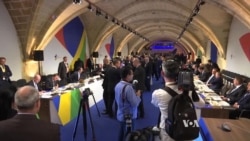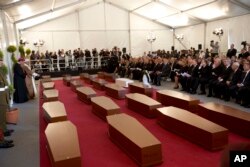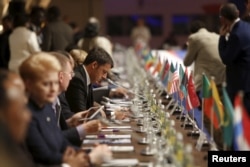At a summit in Malta attended by European and African leaders, the European Union agreed on a nearly $2 billion aid package aimed at tackling the root causes of migration. Hundreds of thousands of people have crossed the Mediterranean this year, overwhelming many European states’ ability to cope with the influx.
On the dockside in Malta’s port of Valletta last April, lines of black hearses took the bodies of migrants, one by one, to the local morgue. Only a few dozen of the estimated 800 people who drowned that day off the Libyan coast were brought ashore, the rest have never been found.
That tragedy led to this week’s summit in Malta, where European leaders were joined by 13 African heads of state. The European Union agreed on a $1.9 billion fund aimed at addressing what it called ‘the root causes of migration.” The money is aimed at creating jobs, improving healthcare and conflict prevention.
The plan received a mixed response from many African leaders, including Niger President Mahamadou Issoufou.
Issoufou said $1.9 billion is not enough, it is far from being enough. The needs are enormous. That is why the EU are calling on other partners to participate in the setting up of trust funds.
The Italian prime minister, Matteo Renzi, dismissed criticism of the EU deal.
Renzi said these are judgments coming from those who always see the glass half empty. He said he saw a glass that is much more than half full, because, first, Italy was not alone anymore in dealing with the refugees issue, and secondly, Africa was a priority.
But the figures suggested Africa was not the number one priority, said Marta Foresti of the Overseas Development Institute.
“Three billion euros were pledged to Turkey to help support the response to the current crisis in Syria. So from that perspective, just by way of comparison, 1.8 billion euros [$1.9 billion] for the whole of the African continent is probably not enough,” said Foresti.
European leaders presented a 17-page "action plan" to tackle the crisis. In addition to the fund, Europe will attempt to sign individual migration agreements with African countries in return for development aid.
The number of people crossing the Mediterranean from Africa is small compared to the arrival of over 650,000, mostly Syrians, who came through Turkey and Greece. Most are trying to reach northern Europe.
Sweden, long seen as the beacon of support for migrant rights on the continent, became the latest member of Europe’s passport-free Schengen zone to re-introduce temporary border checks Thursday.







